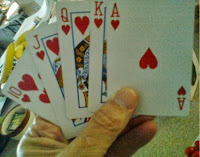I play in a small time limit tournament. There are a few oddities that require adjustments.
First, the game pays only first and second place, not third. It also pays something for highest hand, which is a wrinkle l will mention later. Re-buys are possible only when busted and stop an hour and fifteen minutes before the tournament ends.
Strategy adjustments:
Some of the players are sharp, some are not. The general strategy is to play tight to begin with, loosen up in the middle phase and then carefully assess the final stage. Second place does not pay much: for example it paid $10 in last weeks nine player game. I had one re-buy so my take was only $3 ($4 buy-in, one $3 re-buy).
The extra dollar on the first buy is the prize for highest hand, so in that game it was $9. Your hand MUST be called to qualify; if you go all-in with a straight flush and everyone folds, that hand does not qualify.
The final stage is interesting. Because the game ends at 2:30 (the last hand is played out, though), you need to know how many chips other players have. As not everybody stacks their chips neatly and doesn't always color up (exchange lower value chips for larger as the blinds increase), that can be challenging.
It's important because it affects your last few hands. If you are in third place, you have nothing. Obviously you'd call an all-in bet to try to get to second if it was made by the second place person.
But if you are sitting in second place, you might want to just fold. Or you might want to take a stab at first place. It gets very confused if there are three or four weak stacks still playing - if they all go in, the combined pot might be enough to push you out of second place!
If you are in first place but do not have more than 50% of the chips, you might be forced in because having the pot go elsewhere might push you to second place.
You might want to play just because you have a chance at the high hand money. If you can't possibly make second place, you still likely have a shot at that - you might as well be in the hand!
But how can you make those other decisions if you can't accurately see how much others have?
The answer is to know how many chips are in the game. Keep track of the re-buys so that you always know. Subtract what you have and that's what is against you. If you can count or at least guesstimate the low stacks, you have a pretty good idea of your competition. Then you can decide to play or not - the cards you hold may not matter one bit, because third place pays just as much as tenth - that is, it pays nothing.

No comments:
Post a Comment